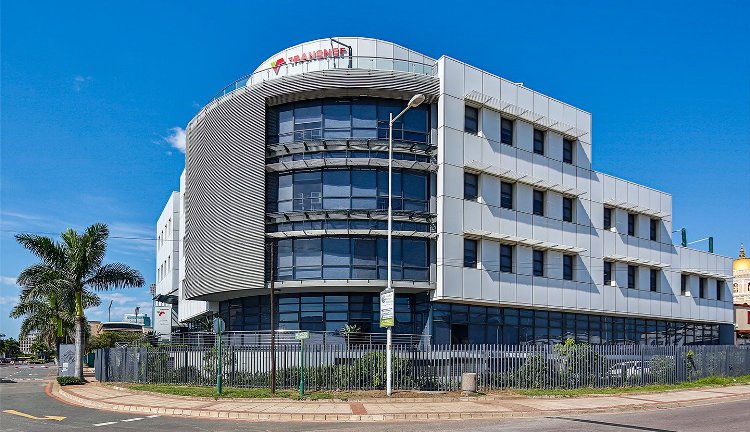Transnet’s Digital Tender Portal Sets Gold Standard in Public Procurement Reform
Four years ago, Transnet replaced traditional paper-based tender processes and physical tender boxes with a cloud-based, secure digital procurement system.

- Country:
- South Africa
Transnet, South Africa's state-owned logistics giant, has received national acclaim for transforming public procurement through its fully digital e-Tender platform, an initiative that is driving efficiency, transparency, and inclusive economic participation. The company was honoured with the GIBS Logistics Achiever Gold Award (LAA) 2025 for this innovation during a prestigious ceremony at the GIBS Business School in Johannesburg.
This recognition places Transnet at the forefront of public sector digital transformation, setting a new benchmark for how state-owned enterprises can leverage technology to promote operational excellence while advancing South Africa's developmental goals.
From Paper to Platform: A New Procurement Era
Four years ago, Transnet replaced traditional paper-based tender processes and physical tender boxes with a cloud-based, secure digital procurement system. Since October 2021, the company has not used physical tender boxes, ushering in an era of paperless procurement that has reshaped the organisation's supply chain management practices.
The shift has dramatically increased efficiency by removing cumbersome manual processes such as stamping, signing, and archiving. These tasks consumed substantial administrative resources that have since been redeployed to strategic and value-adding functions within the business.
"We have not had physical tender boxes at Transnet since October 2021. This innovation has fundamentally changed the speed and integrity of Transnet's supply chain management," said Vuledzani Nemukula, Group Chief Procurement Officer at Transnet.
Transparency, Governance, and Financial Impact
The e-Tender platform is designed with embedded governance features, including automated business rules, real-time reporting, and a comprehensive audit trail, ensuring full accountability and oversight. These controls have led to a verified 40% reduction in irregular expenditure, a major achievement in the context of public financial management.
The platform's robust functionality has processed over one million procurement documents since its launch, while simultaneously generating substantial financial returns. In the 2024/2025 financial year alone, the platform contributed to R1.8 billion in value delivery for Transnet.
This financial impact, paired with improved governance, marks the platform as a powerful instrument not only for internal transformation but also for setting national procurement standards.
Enabling Inclusive Access for SMMEs
A core feature of the e-Tender platform is its commitment to inclusivity. The platform breaks down barriers for small, medium, and micro enterprises (SMMEs) by eliminating the costs and geographic constraints tied to traditional, paper-heavy procurement processes.
To further support SMMEs, Transnet has adapted the platform's submission times to align with off-peak data usage, allowing entrepreneurs to upload large documents using night-time data, which is typically more affordable.
"By removing the physical and financial barriers associated with paper-based tenders, the e-Tender portal has significantly increased accessibility for SMMEs across the country," Nemukula stated.
Currently, more than 30,000 suppliers are registered on the platform, expanding the pool of potential vendors and increasing competition and transparency within Transnet's procurement ecosystem.
A Foundation for Digital Intelligence and Analytics
More than just a digital transaction tool, Transnet views the e-Tender portal as a cornerstone of the knowledge economy. By standardising procurement data, the platform is laying the groundwork for advanced analytics, predictive insights, and performance monitoring, critical for future decision-making in both business and government.
This vision is reinforced by Pandelani Munyai, Transnet's Group Chief Information Officer, who described the initiative as part of the company's broader ICT Digital Modernisation Strategy.
"We are not just digitising workflows — we are redefining how the enterprise operates," Munyai said.
"Our vision is to make automation a catalyst for growth, where technology enhances human capability, accelerates service delivery, and strengthens Transnet's competitiveness in a connected, data-driven economy."
Strategic Collaboration Powers the Transformation
The successful rollout of the e-Tender platform is attributed to the close collaboration between the procurement and ICT functions at Transnet. The Group CIO and Group CPO jointly led the initiative, ensuring co-ownership of outcomes and alignment of digital capabilities with business needs.
Their leadership has become a model for how internal cross-functional partnerships can deliver system-wide transformation with lasting impact.
"The e-Tender portal is a critical enabler of Transnet's vision for a responsive, ethical, and data-driven public enterprise," said Munyai.
National Implications and Global Relevance
Transnet's e-Tender platform directly supports South Africa's national mandate for inclusive economic growth, and the success of the system is already influencing conversations around replicating the model across other state entities.
By demonstrating that digital innovation can enhance both operational integrity and economic participation, Transnet has positioned itself not only as a logistics leader but also as a champion of modern, accountable governance.
As global economies increasingly shift toward digital platforms and AI-powered decision-making, South Africa now has a home-grown example of how technology can be harnessed to build fairer, more efficient public institutions.









